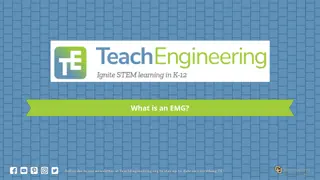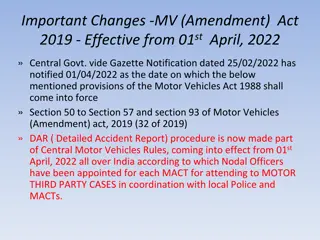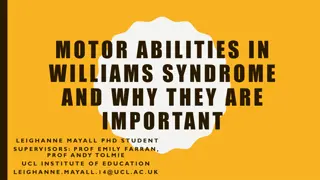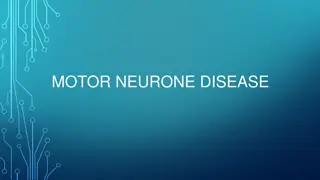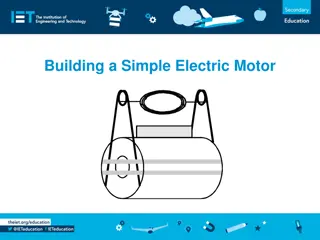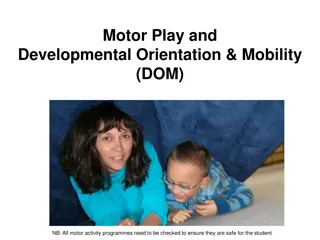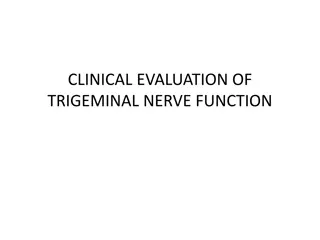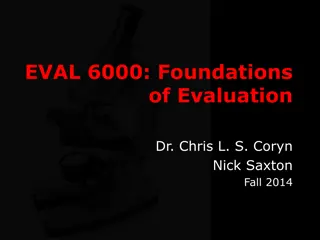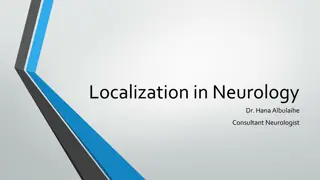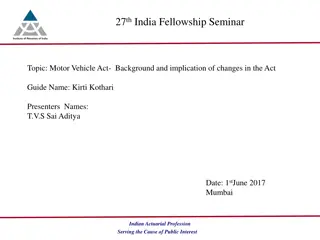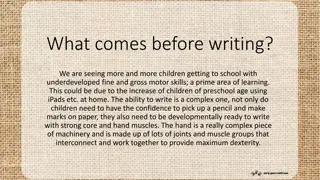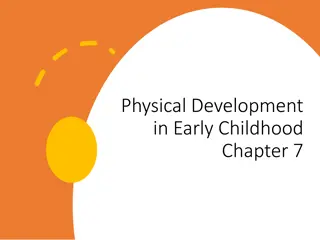Actions Emanating from the Evaluation of the Governance Reform
The evaluation of the governance reform within the WMO aimed to assess its alignment with strategic objectives, effectiveness in responding to societal needs, coordination efficiency, decision-making process, agility, and more. Evaluation criteria included relevance, design validity, effectiveness,
2 views • 13 slides
Controlling DC Motor using PictoBlox
Learn to control a DC motor using PictoBlox programming by setting the direction and speed of the motor, using a potentiometer and slide switch. Understand what a DC motor is, how it functions, and how to control its speed. Explore circuit diagrams, motor controlling blocks, and the process of contr
1 views • 20 slides
Comprehensive School Quality Assurance and Evaluation Process
A detailed insight into the Quality Assurance Department's role in school evaluation and improvement processes, including Whole School Evaluation (WSE), Follow-through initiatives, Teaching and Learning assessments, Resumption and Examination Monitoring. The process involves both internal self-evalu
1 views • 20 slides
Methods of Training Evaluation: Overview and Importance
Training and development are fast-growing fields globally, including in India. Evaluation plays a crucial role in understanding the effectiveness and efficiency of training programs for human resource development. This presentation covers the concept of training, evaluation strategies, methods/model
0 views • 61 slides
Universal Evaluation Framework: Simplifying Evaluation Processes
This session introduces the Universal Evaluation Framework (UEF) developed for evaluating QAA Scotland Enhancement Themes. Participants learn key evaluation questions, evidence capture, and the Theory of Change to enhance evaluation confidence. The QAA Scotland Evaluation Odyssey details historical
3 views • 14 slides
Implementing Blind Evaluation Pilot in HORIZON EUROPE: Key Facts and Process
HORIZON EUROPE is conducting a pilot on Blind Evaluation in the 2023-2024 work program to address biases in the research and innovation evaluation process. The pilot aims to assess the feasibility of blind evaluations in ensuring fairness and mitigating potential biases towards well-known organizati
9 views • 9 slides
Strengthening National Evaluation Capacity in the Era of Sustainable Development Goals
The presentation by Vijayalakshmi Vadivelu at the National Evaluation Capacities Conference 2017 in Istanbul focused on the importance of strengthening national evaluation capacity in alignment with the Sustainable Development Goals (SDGs). The content covers the holistic approach to national evalua
3 views • 18 slides
Exploring Developmental Evaluation for Better Decision-Making
Delve into the realm of developmental evaluation, focusing on its purpose, principles, and application in practice. Understand how developmental evaluation emphasizes real-time data collection for informed decision-making in complex systems. Learn about key principles such as developmental purpose,
1 views • 25 slides
Evaluation Practices in Macedonia: What Works, What Doesn't
The comparison between the effectiveness of evaluation practices and the presence of formal institutions in Macedonia raises questions about the impact of institutional design on outcomes. While some countries with robust evaluation institutions fall short in practice, others lacking such structures
1 views • 7 slides
Understanding Electromyography (EMG) and Motor Neurons
Electromyography (EMG) is an electrodiagnostic technique used to evaluate muscle health by measuring electrical activity. EMG measures muscle response to nerve signals, displayed as waves on an oscilloscope. Motor neurons transmit signals from the brain to muscles, enabling movement. Upper motor neu
2 views • 8 slides
Important Changes in Motor Vehicles Act 1988 and Motor Vehicles Amendment Act 2019
Central Government has announced amendments to the Motor Vehicles Act 1988 and Motor Vehicles Amendment Act 2019 effective from April 1, 2022. The changes include the implementation of Detailed Accident Report procedures, appointment of Nodal Officers for motor third party cases, and definitions rel
1 views • 18 slides
Enhancing Evaluation Capabilities in Mongolia for Agenda 2030
The Mongolian Evaluation Network in collaboration with UNDP is working to integrate the 2030 Agenda into national strategies and plans, establish institutional coordination mechanisms, align budgets, and enhance data monitoring systems. Key stakeholders including government agencies, NGOs, and inter
0 views • 9 slides
Understanding Demi-Regularity in Realist Evaluation
Realist Evaluation is a theory-driven approach focusing on understanding the context and mechanisms of action behind policies and interventions. This webinar explores the concept of demi-regularity in realist evaluation, its origins, and its application in analyzing complex evidence. Key aspects cov
1 views • 16 slides
Innovative Agromate Device for Remote Motor Control
Control your motor from anywhere with the innovative Agromate telemetric device, enabling remote operation via a simple missed call. This device offers solutions to common farming challenges such as power cuts, wild animals, and rough weather. Agromate works with any service provider's SIM card and
0 views • 31 slides
Understanding Evaluation in Education
Evaluation in education is a comprehensive term that encompasses measurement, testing, and qualitative examination of student behavior. It involves both quantitative and qualitative descriptions, along with value judgments. Differentiating from mere measurement, evaluation provides a deeper analysis
0 views • 28 slides
Motor Abilities in Williams Syndrome and Their Importance
Motor abilities play a crucial role in the developmental journey of individuals with Williams Syndrome. From simple reflex movements to fine and gross motor skills, these abilities impact daily living, academic achievements, and overall cognitive and physical growth. Research on motor skills in both
0 views • 20 slides
MOTOR NEURONE DISEASE
Motor Neurone Disease (MND) is a rare condition affecting the brain and nerves, leading to loss of motor function. There is no cure for MND, and it can impact adults and children, causing symptoms like muscle weakness, speech difficulties, and changes in personality. The Irish Motor Neurone Disease
0 views • 7 slides
Sustainable Evaluation Systems Workshop Summary
Workshop on Sustainable Evaluation Systems by Stephen Porter at the NEC Conference focused on defining evaluation systems, addressing their failures, and emphasizing the importance of quality, use, and networks in achieving sustainability. Participants engaged in activities such as bingo card introd
0 views • 38 slides
Building a Simple Electric Motor Experiment
Learn how to build a simple electric motor step-by-step, including winding the field coil, making end contacts, attaching to a battery, preparing the coil, and assembly. Troubleshooting tips are provided if the motor doesn't work. Experiment ideas include changing the motor's direction, radio interf
0 views • 8 slides
Strategic Management: Strategy Review and Evaluation
This chapter delves into the critical process of strategy review, evaluation, and control in strategic management. It covers the nature of strategy evaluation, effective evaluation systems, contingency planning, auditing, using computers for evaluation, and guidelines for effective strategic managem
1 views • 42 slides
Effective Strategies for Children with Developmental Language Disorder, Sensory Processing Disorder, and Fine Motor Delays
Children with Developmental Language Disorder (DLD), Sensory Processing Disorder (SPD), and Fine Motor Delays often have accompanying sensory and fine motor deficits. Research indicates that addressing sensory processing deficits can significantly benefit children with DLD, ADHD, autism, and other d
0 views • 61 slides
Understanding Evaluation and Ideology in Translation
Evaluation plays a crucial role in the study of translation, influencing both meaning and value in communication. This evaluation is reflected through language elements like accentuation, deletion, and substitution. Appraisal, stance, and evaluation are key terms in linguistic analysis that focus on
2 views • 22 slides
Impact and Evaluation Toolkit for Churches and Christian Charities
This toolkit aims to equip churches and Christian charities engaged in small-scale social action projects to think about impact, measure impact, choose data tools, reflect on evaluation data, and use it effectively. It covers principles of evaluation, setting objectives, selecting indicators, storyt
1 views • 34 slides
Evaluation Metrics for IEEE 802.11-14/0107 HEW Proposal
Evaluation metrics play a crucial role in assessing WLAN system performance and achieving the objectives of High Efficiency WLAN (HEW). This proposal by Yonggang Fang et al. from ZTE outlines the key evaluation metrics recommended for evaluating HEW performance, including area throughput, average th
0 views • 12 slides
Overview of Monitoring and Evaluation in the GEF
The Evaluation in the GEF and Training Module focuses on promoting accountability and learning within the Global Environment Facility (GEF) through monitoring and evaluation activities. The GEF Independent Evaluation Office plays a crucial role in assessing results, effectiveness, and performance of
0 views • 25 slides
Enhancing Development Through Sensory and Motor Play
Motor play and developmental orientation are essential for children, especially those with vision impairments. Encouraging movement and play helps in developing confidence, purpose, and motor skills. Activities like bouncing, crawling, and climbing aid in brain organization, spatial awareness, and e
2 views • 24 slides
Clinical Evaluation of Trigeminal Nerve Function
Sensory evaluation of trigeminal nerve function involves assessing exteroceptive sensations across its divisions, identifying sensory losses due to lesions, and distinguishing different types of lesions affecting sensation on the face. Motor evaluation focuses on the muscles of mastication to detect
0 views • 34 slides
Chile Country Portfolio Evaluation 2010-2014 Summary
Evaluation process of Chile's country portfolio from 2010-2014 included pre-evaluation, during evaluation, and results/conclusions phases. Challenges like defining scope and participant concerns were addressed. Preliminary conclusions were presented to stakeholders, leading to a trustful and represe
2 views • 6 slides
Potential Amendments for Reforming REACH Evaluation Process
Discussion at the Ad-hoc Meeting of Competent Authorities for REACH and CLP focused on potential options for amending the REACH Regulation to reform the evaluation process. Topics included registration-related measures, substance evaluation, testing proposals, compliance checks, and expectations dur
0 views • 30 slides
Developing an Evaluation Work Plan for Effective Program Assessment
This presentation by Amy D. Andrade from San Jose State University focuses on developing an Evaluation Work Plan to identify responsibilities and timelines. It covers topics such as Evaluation Coaching Support, Webinar Outlines, Logic Model, Inputs-Outputs-Outcomes, Two Approaches to Evaluation, Pro
0 views • 29 slides
Foundations of Evaluation - Conference Experience and Approaches
The Foundations of Evaluation course covers diverse topics such as improvement- and accountability-oriented evaluation approaches, social agenda evaluation, and eclectic approaches. The course material includes insights on decision- and accountability-oriented studies, methods for program improvemen
1 views • 29 slides
Evaluation Synthesis in Changing Contexts: Enhancing Knowledge for Development Effectiveness
Evaluation synthesis is crucial for promoting learning, reflection, and decision-making in development work. This process involves bringing together diverse knowledge sources to generate strategic insights and facilitate wider use of evaluation findings. The Independent Office of Evaluation of IFAD
0 views • 20 slides
Evaluation of FME Zero Emission Neighbourhoods in Smart Cities
The mid-term evaluation process of FME Zero Emission Neighbourhoods in Smart Cities involves self-evaluation, partner evaluation, and panel evaluation. The procedure includes scientific review, evaluation by scholars, and innovation assessment. Key documents like self-reports, progress reports, and
1 views • 20 slides
Understanding Neurology: Localization, Neuroaxis Structures, and Motor Neuron Signs
Explore the intricate world of neurology with a focus on brain localization, neuroaxis structures, and the distinctions between upper and lower motor neuron signs. Delve into the functions of brain lobes, brain stem anatomy, and spinal cord functions. Discover how upper motor neuron signs indicate l
0 views • 52 slides
Implications of 2017 Motor Vehicle Act Amendment
The 2017 Motor Vehicle Act Amendment focuses on reducing road accidents, providing speedy treatment to victims, and establishing a Motor Vehicle Accident Fund. It introduces several key objectives, amendments, and insertions like e-Governance, higher penalties, and improvements in licensing. The ame
0 views • 16 slides
Overview of Regular Evaluation 2017 Findings in Estonia
In the Regular Evaluation 2017, efforts were made to maximize the benefits of evaluation outcomes for various stakeholders in Estonia such as the state, society, and institutions. The evaluation focused on a range of actions including preparing legislation, finding experts, creating self-report form
0 views • 6 slides
Comprehensive Guide to Training Evaluation Methods
This detailed guide covers the aim of evaluation, evaluation methods, techniques of evaluation, types of evaluation (formative, process, outcome, impact), and the significance of formative and process evaluation in assessing training effectiveness. Learn about the key principles and practices involv
1 views • 45 slides
Developing Fine and Gross Motor Skills in Children for Effective Writing
Children's motor skill development is crucial for successful writing. Prior to writing, children need adequate muscle development, starting from gross motor skills to fine motor control. Activities and strategies for improving both types of motor skills are essential in preparing children for succes
1 views • 5 slides
Early Childhood Physical Development Overview
Physical development in early childhood encompasses growth in height and weight, brain development, gross motor skills, and fine motor skills. Children's bodies change significantly between ages 3 to 6, with notable improvements in motor skills and cognitive abilities. Gross motor activities such as
0 views • 15 slides
DC Motor Control Techniques and Configurations
This chapter delves into various aspects of PWM and DC motor control, exploring characteristics of selected DC motors, rotation mechanisms, H-bridge configurations for motor direction control, logic configurations for motor operation, bidirectional motor control using an L298 chip, pulse width modul
0 views • 27 slides









